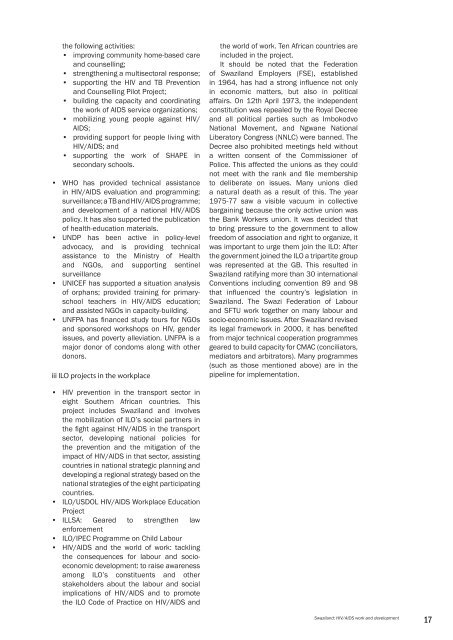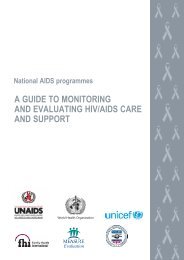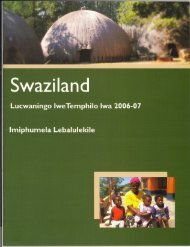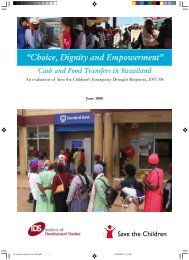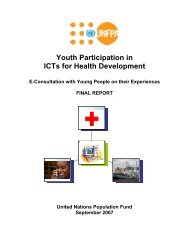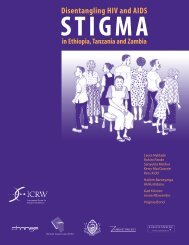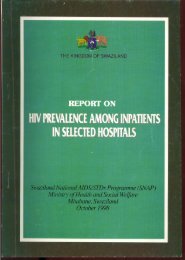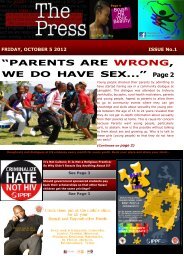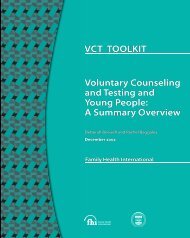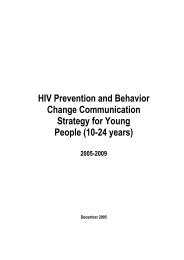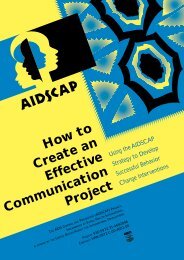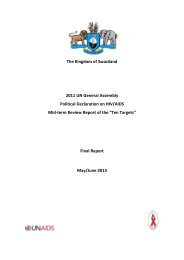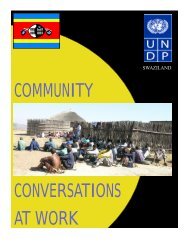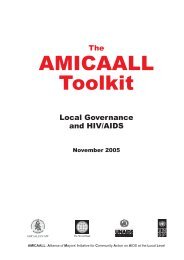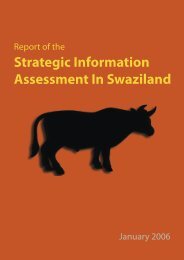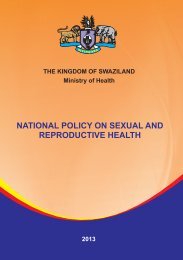HIV/AIDS+WORK Swaziland
HIV/AIDS, work and development - (NERCHA), the Info Centre
HIV/AIDS, work and development - (NERCHA), the Info Centre
- No tags were found...
You also want an ePaper? Increase the reach of your titles
YUMPU automatically turns print PDFs into web optimized ePapers that Google loves.
the following activities:• improving community home-based careand counselling;• strengthening a multisectoral response;• supporting the <strong>HIV</strong> and TB Preventionand Counselling Pilot Project;• building the capacity and coordinatingthe work of AIDS service organizations;• mobilizing young people against <strong>HIV</strong>/AIDS;• providing support for people living with<strong>HIV</strong>/AIDS; and• supporting the work of SHAPE insecondary schools.• WHO has provided technical assistancein <strong>HIV</strong>/AIDS evaluation and programming;surveillance; a TB and <strong>HIV</strong>/AIDS programme;and development of a national <strong>HIV</strong>/AIDSpolicy. It has also supported the publicationof health-education materials.• UNDP has been active in policy-leveladvocacy, and is providing technicalassistance to the Ministry of Healthand NGOs, and supporting sentinelsurveillance• UNICEF has supported a situation analysisof orphans; provided training for primaryschoolteachers in <strong>HIV</strong>/AIDS education;and assisted NGOs in capacity-building.• UNFPA has financed study tours for NGOsand sponsored workshops on <strong>HIV</strong>, genderissues, and poverty alleviation. UNFPA is amajor donor of condoms along with otherdonors.iii ILO projects in the workplacethe world of work. Ten African countries areincluded in the project.It should be noted that the Federationof <strong>Swaziland</strong> Employers (FSE), establishedin 1964, has had a strong influence not onlyin economic matters, but also in politicalaffairs. On 12th April 1973, the independentconstitution was repealed by the Royal Decreeand all political parties such as ImbokodvoNational Movement, and Ngwane NationalLiberatory Congress (NNLC) were banned. TheDecree also prohibited meetings held withouta written consent of the Commissioner ofPolice. This affected the unions as they couldnot meet with the rank and file membershipto deliberate on issues. Many unions dieda natural death as a result of this. The year1975-77 saw a visible vacuum in collectivebargaining because the only active union wasthe Bank Workers union. It was decided thatto bring pressure to the government to allowfreedom of association and right to organize, itwas important to urge them join the ILO: Afterthe government joined the ILO a tripartite groupwas represented at the GB. This resulted in<strong>Swaziland</strong> ratifying more than 30 internationalConventions including convention 89 and 98that influenced the country’s legislation in<strong>Swaziland</strong>. The Swazi Federation of Labourand SFTU work together on many labour andsocio-economic issues. After <strong>Swaziland</strong> revisedits legal framework in 2000, it has benefitedfrom major technical cooperation programmesgeared to build capacity for CMAC (conciliators,mediators and arbitrators). Many programmes(such as those mentioned above) are in thepipeline for implementation.• <strong>HIV</strong> prevention in the transport sector ineight Southern African countries. Thisproject includes <strong>Swaziland</strong> and involvesthe mobilization of ILO’s social partners inthe fight against <strong>HIV</strong>/AIDS in the transportsector, developing national policies forthe prevention and the mitigation of theimpact of <strong>HIV</strong>/AIDS in that sector, assistingcountries in national strategic planning anddeveloping a regional strategy based on thenational strategies of the eight participatingcountries.• ILO/USDOL <strong>HIV</strong>/AIDS Workplace EducationProject• ILLSA: Geared to strengthen lawenforcement• ILO/IPEC Programme on Child Labour• <strong>HIV</strong>/AIDS and the world of work: tacklingthe consequences for labour and socioeconomicdevelopment: to raise awarenessamong ILO’s constituents and otherstakeholders about the labour and socialimplications of <strong>HIV</strong>/AIDS and to promotethe ILO Code of Practice on <strong>HIV</strong>/AIDS and<strong>Swaziland</strong>: <strong>HIV</strong>/AIDS work and development17


